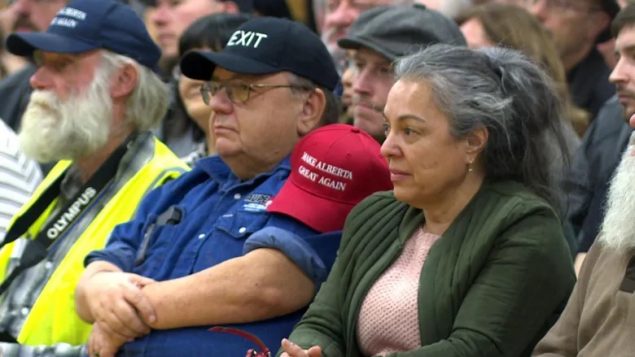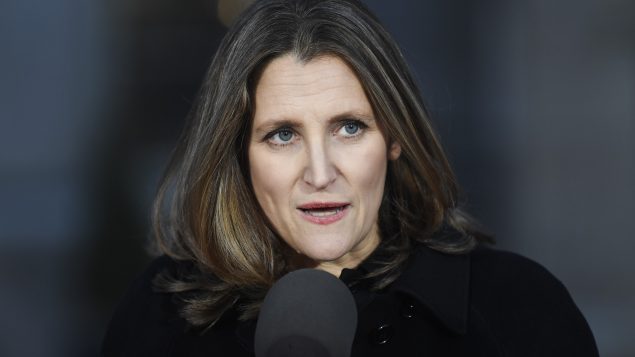Prime Minister Justin Trudeau unveiled his new cabinet Wednesday as the Liberals began a challenging second term in a minority government amid rising discontent in the oil-rich Western Canadian provinces of Alberta and Saskatchewan over federal energy and climate change policies.
The Liberals won the plurality of seats in the Oct. 21 federal election but fell 13 seats short of forming a majority government, forcing them to rely on the support of other parties to stay in power.
The Liberals also failed to elect any legislators in Alberta and Saskatchewan, where Conservative provincial governments have vehemently opposed the Trudeau’s policies on taxing carbon emissions.
To deal with the growing Western alienation Trudeau tapped his former foreign affairs minister Chrystia Freeland, who was promoted to deputy prime minister and minister of intergovernmental affairs in hopes that she will use her considerable diplomatic skills to address mounting political frustration in the West.
Freeland, who was credited with stickhandling the renegotiation of the crucial free trade accord with the U.S. and Mexico, will have one of the most challenging cabinet portfolios as she tries to build bridges between Ottawa and Western Canada.
Tackling Western alienation

Attendees at a Saturday evening rally in Calgary listen as Wexit Leader Peter Downing speaks. (Terri Trembath/CBC)
Frustration with Liberal climate policies and delays and cancellations of construction of key oil pipelines to transport oil from Alberta and Saskatchewan to world markets through port terminals in British Columbia and Atlantic Canada has rekindled a small but vocal Western separatist movement.
The so-called Wexit (Western Exit) movement seeks the separation of Alberta, Saskatchewan and Manitoba from the rest of Canada.
Speaking to reporters in Ottawa, Trudeau said he was “very much looking forward to” having Freeland as his deputy prime minister.
“She is someone with whom I’ve worked very-very closely and with great success on renegotiating the North American Free Trade Agreement with the challenges of the American administration,” Trudeau said.
“And we know as we move forward with issues that matter right across the country – energy, the environment and other large issues – we’re going to have to engage in a strong and positive way with different orders of government… and I’m very much looking forward to doing that with Chrystia by my side.”
‘Building on lessons from NAFTA’

Canadian Foreign Minister Chrystia Freeland, Mexican Economy Minister Ildefonso Guajardo and U.S. Trade Representative Robert Lighthizer pose for a photo during a joint news conference on the closing of the seventh round of NAFTA talks in Mexico City, Mexico March 5, 2018. (Edgard Garrido/REUTERS)
Canada is facing new challenges today, Freeland told the media during a brief press conference in Ottawa.
“Notably the challenge around being sure that we can act united as a country facing the big threats in the world today, united as a country facing the existential challenge of climate change, united as a country facing the challenge of being sure Canadians have great jobs and a strong social welfare net,” Freeland said.
“And these big challenges that we’re facing today in 2019, very-very many of them require an effective relationship between the provinces and the federal government.”
Freeland said she will focus her efforts on building those relationships to face these challenges as “Team Canada.”
Freeland, who was born and grew up in Alberta but now lives in Toronto, said she will draw on her experience of NAFTA negotiations to build the bridges with Western Canada.
“The strongest learning we came out of the NAFTA negotiation was you have to face the big challenges untied as a country and that is what we need to do when it comes to confronting the big issues of our time,” Freeland said. “I think what we need to do as a federal government when it comes to the West and when it comes to all our provincial relationships is really listen hard.”
Quebec MP François-Philippe Champagne was named Canada’s new foreign affairs minister, however, Freeland will retain the oversight of the NAFTA ratification process and the overall U.S.-Canada relationship.







For reasons beyond our control, and for an undetermined period of time, our comment section is now closed. However, our social networks remain open to your contributions.